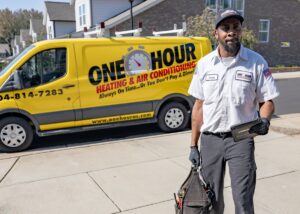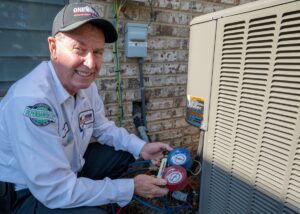When Your AC Stops Working: Who to Call and What to Expect
Hey there! So your air conditioner just decided to quit on you during the hottest part of summer? Talk about terrible timing. We’ve all been there – standing in front of the thermostat, pressing buttons desperately, wondering why your home suddenly feels like a sauna. After you’ve checked the obvious things (yes, it’s turned on; yes, the thermostat is set correctly), you’re probably asking yourself: “Who do I call, and how fast can they get here?”
As someone who’s helped countless homeowners through these sweaty, frustrating moments, let me walk you through exactly what you need to know when your AC gives up on life.
Is It Time to Call a Pro? (Spoiler: Probably Yes)
Look, I get it. Nobody wants to make that service call if they don’t have to. But here’s the truth – waiting too long often turns a simple fix into a complicated (and expensive) repair. Here’s how to know when it’s definitely time to pick up the phone:
- Your AC won’t even turn on? That’s a clear red flag. When you adjust the thermostat and hear… absolutely nothing? No click, no hum, no signs of life whatsoever? Something’s definitely wrong with either the power supply, the thermostat communication, or the unit itself.
- Or maybe your system is running – you can hear it – but the air coming out feels like it’s straight from the desert. This usually points to refrigerant issues, a failing compressor, or airflow problems. Either way, your AC is working hard and accomplishing nothing except running up your electric bill.
- Strange noises should never be ignored. Your AC should hum along quietly, not bang, screech, or grind. Those sounds usually mean something’s loose or a component is on its last legs. Trust me, these problems don’t fix themselves – they just get louder until something breaks completely.
- Finding puddles around your indoor or outdoor unit? A little condensation is normal, but actual pools of water mean you likely have a clogged drain line or maybe a frozen coil that’s now thawing out. Water and electronic components don’t mix well, so this needs attention fast.
- The most frustrating problem might be when your AC keeps turning on and off rapidly. This “short cycling” is hard on your system and sends your energy bills through the roof. It could be something simple like a thermostat issue or something more complex with the control board.
- And if you ever smell something burning or electrical coming from your vents? Turn the system off immediately and call for help. That’s potentially dangerous and needs professional eyes on it right away.
Who Should You Trust With Your Comfort?
When you’re sweating it out, you need someone reliable – not someone who’ll put you on a three-day waiting list or show up without the right parts. You need a team that treats your emergency like it actually matters (because it does!).
The ideal service provider should be able to diagnose, repair, and offer advice all in one visit. You shouldn’t need to call one company for the diagnosis, another for parts, and a third for the actual repair. That’s just madness when you’re already uncomfortable.
What you really want is a company that’s going to take ownership of your problem from the first phone call until cool air is flowing through your vents again.
What Happens When the Pros Arrive
A quality AC service call should follow a clear process that respects both your time and your intelligence.
Here’s what you should expect:
- First, they should actually listen to you. Crazy concept, right? But you know your home and your system better than anyone. When you explain that “it makes this weird buzzing sound right before it shuts off” or “it worked fine until we had that power outage,” those are valuable clues that save diagnosis time.
- A thorough inspection comes next. Good technicians don’t just check one component and call it a day. They look at the whole system – from the thermostat on your wall to the condenser unit outside, checking electrical connections, refrigerant levels, coil condition, and airflow patterns.
- Finding the root cause is critical. Band-aid fixes might get you cool for today, but they’ll leave you calling for service again next week. The right technician identifies not just what’s broken, but why it broke in the first place.
- On-the-spot repairs save you time and discomfort. The best service vehicles are rolling parts warehouses, carrying the components needed for most common repairs. This means you don’t have to wait days for parts to be ordered and delivered.
- After repairs, comprehensive testing ensures everything is working properly. The technician should check cycle times, temperature differentials, and system pressures – not just turn it on and declare victory.
- Finally, clear communication about what happened, what was done, and how to prevent future issues completes the service. You deserve to understand what went wrong with your system without needing an engineering degree.
Questions Everyone Asks When Their AC Dies
Can I try fixing it myself first?
You can safely check a few things: make sure your thermostat has power and is set correctly, check that your circuit breaker hasn’t tripped, and ensure your air filter isn’t clogged solid. Beyond that, DIY AC repair usually leads to bigger problems. Air conditioning systems contain high-voltage electricity and pressurized refrigerants – both can be dangerous if mishandled.
What if my AC breaks down at 9 PM on a Saturday?
A good HVAC company offers emergency service because they understand comfort emergencies don’t just happen during business hours. Heat-related health issues are serious, and reliable companies recognize this with 24/7 availability.
How long will I have to wait for my AC to be fixed?
Most repairs can be completed in a single visit if the technician comes prepared with common parts. If they need to order something specific, they should give you a clear timeline, not a vague “we’ll let you know.”
Could something as simple as a dirty filter really cause my whole system to fail?
Absolutely! A clogged filter restricts airflow, which can cause your evaporator coil to freeze or your system to overheat and shut down. This $20 maintenance item can prevent $1,000+ repairs if changed regularly.
My AC seems to need repairs every summer. Is it time for a new one?
If your system needs frequent repairs, especially if it’s more than 10-12 years old, it might be more economical to replace it. A good technician will give you honest advice about repair versus replacement, considering both immediate costs and long-term savings on efficiency and reliability.
Don’t Suffer Through the Heat – Get Help Now
When your AC stops working, every minute feels like an hour. Don’t waste time trying solutions you found in the deep corners of internet forums or waiting for companies that can’t fit you in for days.
Call professionals who will:
- Show up when promised
- Find the actual problem
- Fix it right the first time
- Stand behind their work
Your comfort matters, and so does your time. The right AC service team understands this and treats your emergency with the urgency it deserves. When the heat is unbearable, you don’t need excuses – you need solutions.
Don’t let a failing AC ruin your day (or week!). Get help from people who care about solving your problem completely, not just temporarily. The right fix means you can get back to enjoying your home, not watching the thermostat and hoping the cool air keeps coming.

